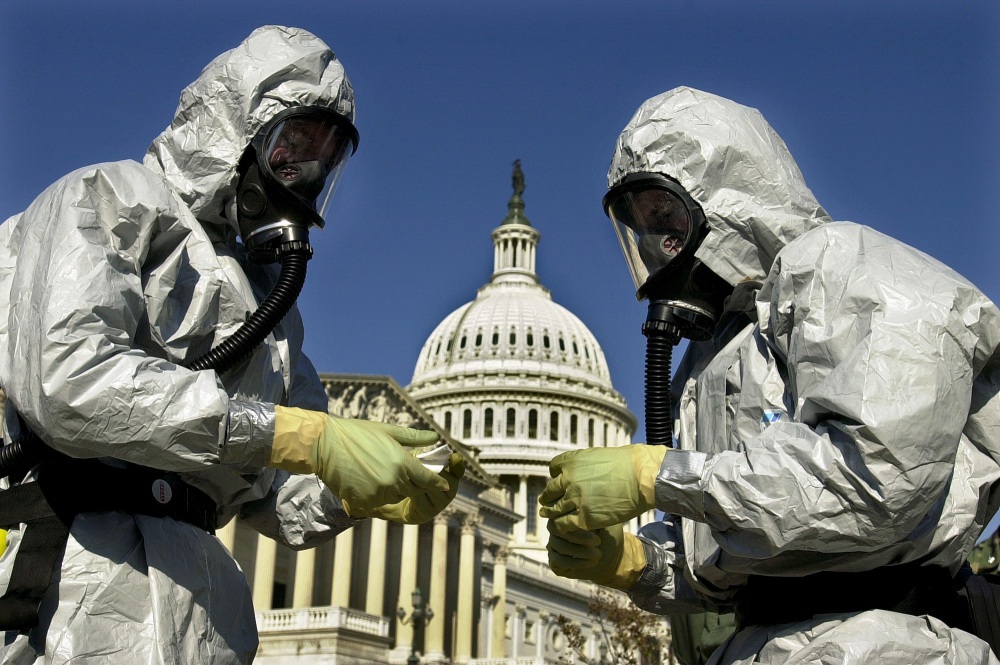
Jaime M. Yassif, Ph.D.
Vice President, Global Biological Policy and Programs
Following the recent detection of monkeypox cases across multiple countries, NTI’s report on the exercise has appeared in a number social media outlets, noting that the associated fictional scenario featured a monkeypox outbreak with a start date that roughly coincides with the current, ongoing outbreak.
In March 2021, NTI partnered with the Munich Security Conference to conduct a tabletop exercise on reducing high-consequence biological threats. The exercise examined gaps in national and international biosecurity and pandemic preparedness architectures—exploring opportunities to improve prevention and response capabilities for high-consequence biological events. Participants included 19 senior leaders and experts from across Africa, the Americas, Asia, and Europe with decades of combined experience in public health, biotechnology industry, international security, and philanthropy.
This report, Strengthening Global Systems to Prevent and Respond to High-Consequence Biological Threats: Results from the 2021 Tabletop Exercise Conducted in Partnership with the Munich Security Conference, written by Jaime M. Yassif, Ph.D., Kevin P. O’Prey, Ph.D., and Christopher R. Isaac, M.Sc., summarizes key findings from the exercise and offers actionable recommendations for the international community.
Developed in consultation with technical and policy experts, the fictional exercise scenario portrayed a deadly, global pandemic involving an unusual strain of monkeypox virus that first emerged in the fictional nation of Brinia and spread globally over 18 months. Ultimately, the exercise scenario revealed that the initial outbreak was caused by a terrorist attack using a pathogen engineered in a laboratory with inadequate biosafety and biosecurity provisions and weak oversight. By the end of the exercise, the fictional pandemic resulted in more than three billion cases and 270 million fatalities worldwide.
Discussions throughout the tabletop exercise generated a range of valuable insights and key findings. Most significantly, exercise participants agreed that, notwithstanding improvements following the global response to COVID-19, the international system of pandemic prevention, detection, analysis, warning, and response is woefully inadequate to address current and anticipated future challenges. Gaps in the international biosecurity and pandemic preparedness architecture are extensive and fundamental, undermining the ability of the international community to prevent and mount effective responses to future biological events—including those that could match the impacts of COVID-19 or cause damage that is significantly more severe.
Discussion among exercise participants led to the following key findings:
(The full findings are available on page 14 of the report.)
To address these findings, the report authors developed the following recommendations:
(The full recommendations are available on page 22 of the report.)
Click here to learn more about the November 23, 2021 launch event for this report on the margins of the Biological Weapons Convention Meeting of States Parties.
To learn more about NTI’s previous tabletop exercises at the Munich Security Conference, see our 2019 report, “A Spreading Plague,” and our 2020 report, “Preventing Global Catastrophic Biological Risks.”
Sign up for our newsletter to get the latest on nuclear and biological threats.
Testimony of Jaime M. Yassif at U.S. House Hearing on "Strengthening Biosafety and Biosecurity Standards: Protecting Against Future Pandemics"
A new NTI | bio report describes the status of benchtop DNA synthesis devices, explains the risks for biosecurity, and recommends action and oversight by governments, industry, and the scientific community.
Understanding biological weapons, as well as biosafety, biosecurity, and BW nonproliferation, is the focus of this tutorial.


